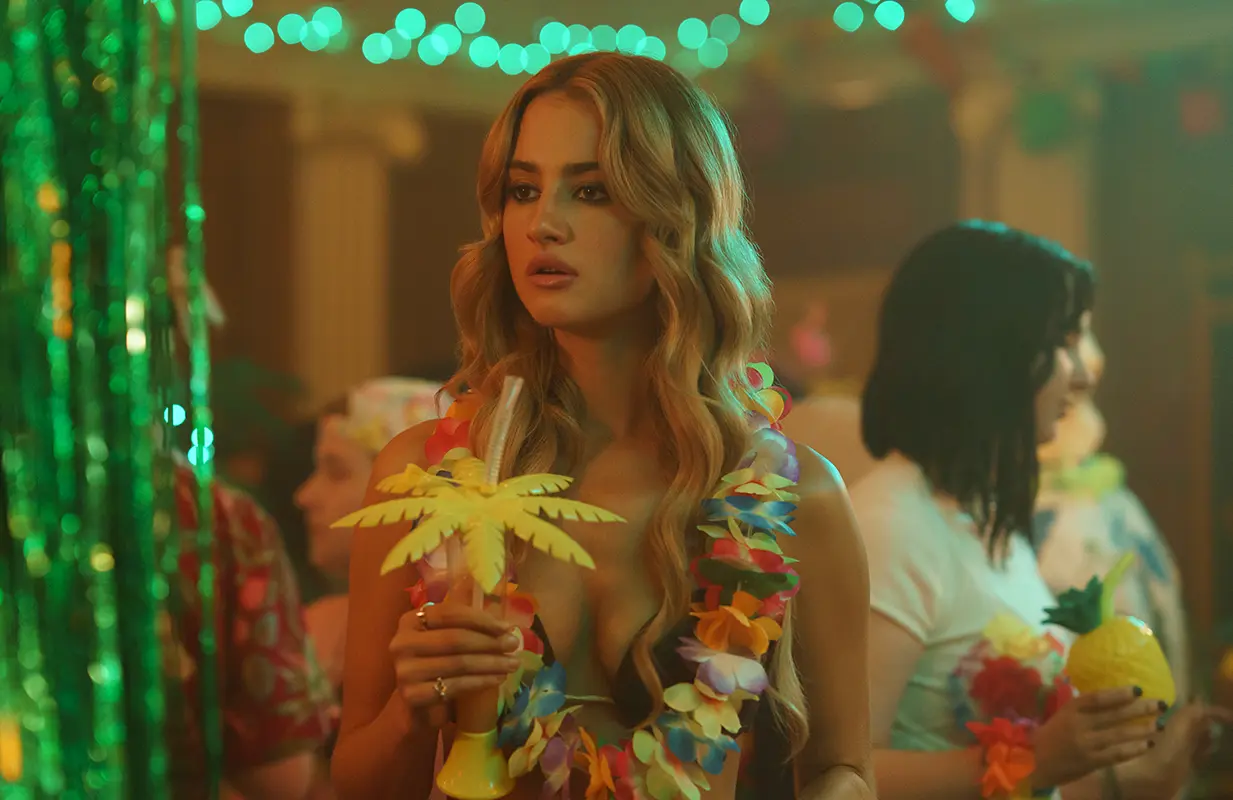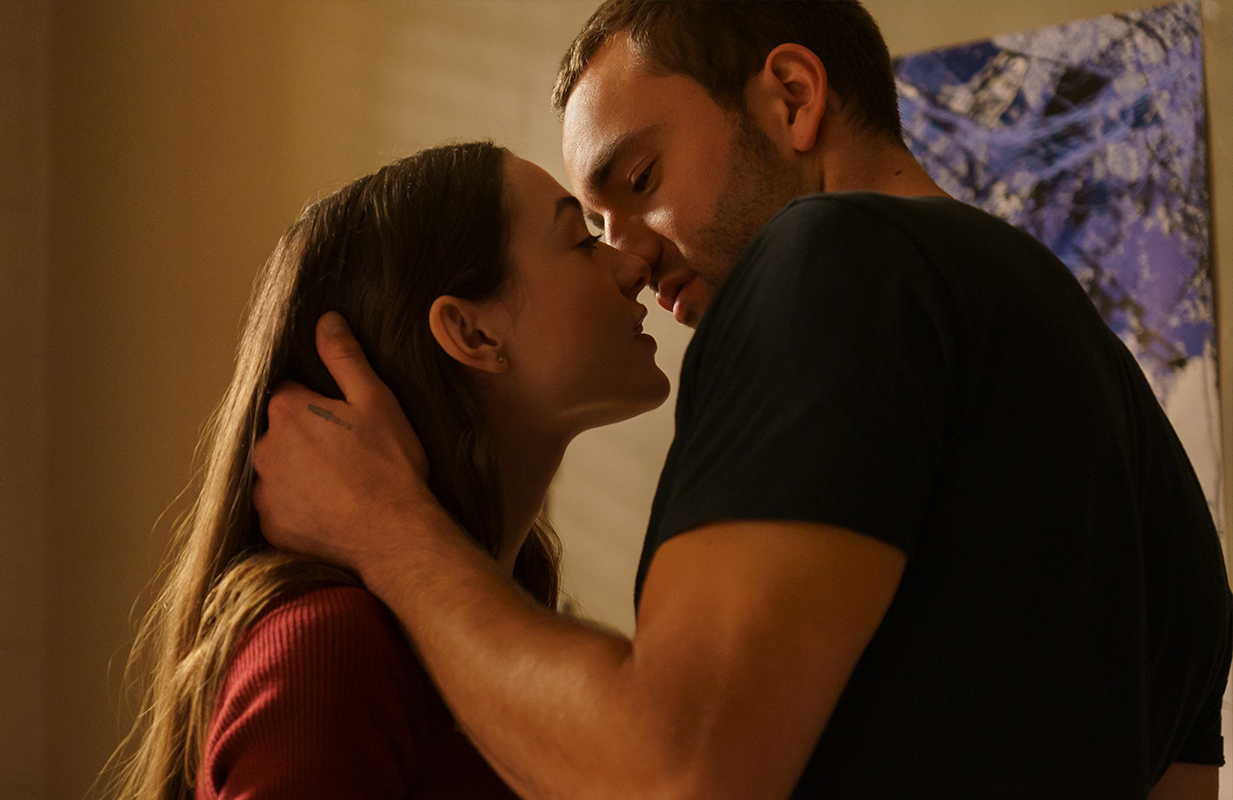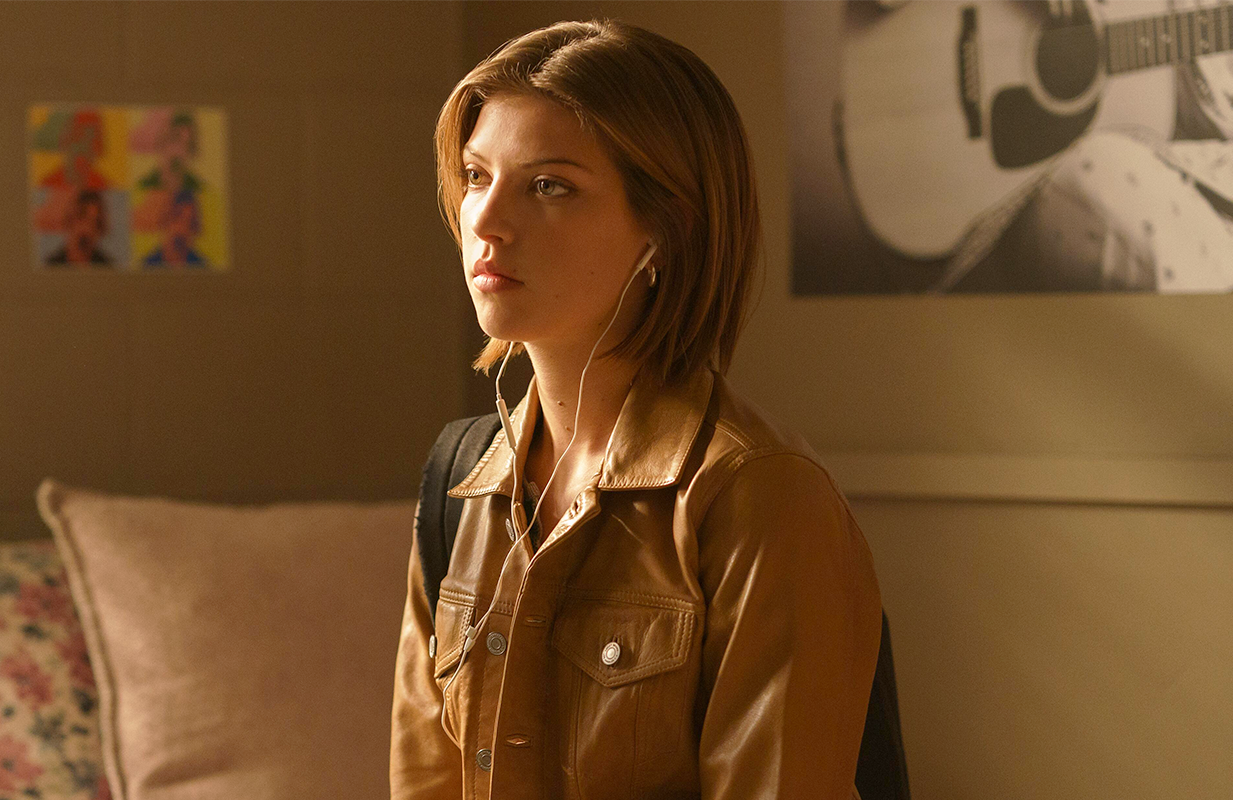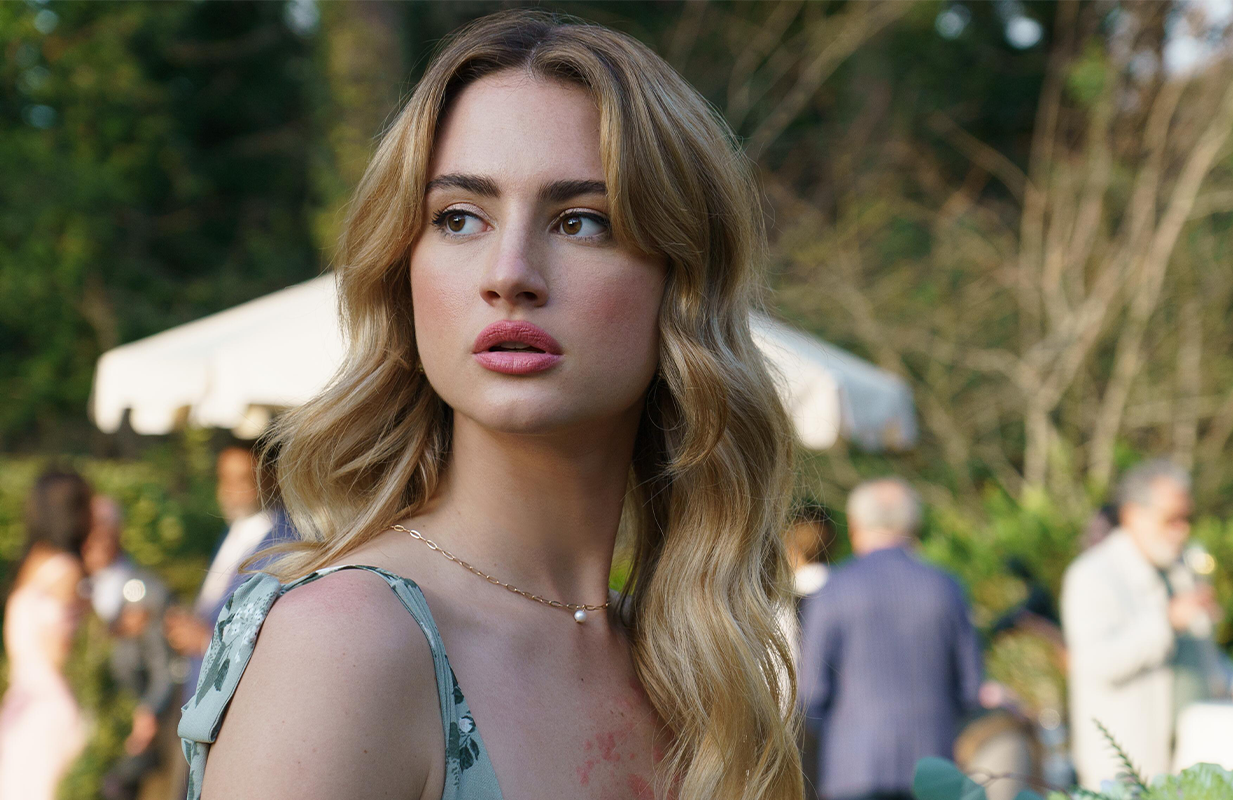Tell Me Lies Creator Breaks Down the Finale's Shocking Reveal
-
 Grace Van Patten in the Tell Me Lies Season 1 finale. (Photo: Hulu)
Grace Van Patten in the Tell Me Lies Season 1 finale. (Photo: Hulu)[Editor’s note: This interview contains major spoilers for the Tell Me Lies Season 1 finale, “The Bedrooms of Our Friends.”]
Tell Me Lies creator Meaghan Oppenheimer always envisioned the Hulu drama going out with a bang. The Season 1 finale delivers one bombshell after another, beginning with Stephen’s (Jackson White) involvement in Macy’s (Lily McInerny) death. For the first time, viewers see the events of the premiere from Macy’s perspective, and flashbacks reveal that Stephen, who was driving under the influence that night, moved Macy’s body to the driver’s seat and left her for dead after crashing into a tree.
Stephen’s selfish decision is perhaps the least surprising moment in the finale, which also brings his relationship with Lucy (Grace Van Patten) to a close — for now — and sees Lucy fall into bed with Evan (Branden Cook). Still, it’s the last-minute revelation that Stephen is now engaged to Lucy’s high school best friend Lydia (Natalee Linez), a plot twist that doesn’t appear in Carola Lovering’s novel, that’s sure to leave viewers with plenty of questions. As Oppenheimer tells Primetimer, “I intentionally didn't put any clues because it was like, no one is going to see this coming.”
In an interview, Oppenheimer shares the “crazy” reveal in the episode’s final seconds, that “Mr. Brightside” needle drop, and her plans for a possible Season 2.
The finale begins by replaying the first few days of freshman year from Macy’s perspective. Was this shift to Macy’s point of view something you knew you wanted to include?
That was actually in my initial pitch of the whole show. Before I had gotten hired for the job, I had to pitch my season overview, and I knew that’s how I wanted to open the finale. Especially because we had those point of view episodes for a lot of the other ensemble characters, so I thought that would be a good shocker.

Did you ever wrestle with Stephen’s complicity in Macy’s death?
I never wavered on that. I always felt like he needed to be responsible. What I did go back and forth on, and we all did throughout the season — it was sort of a balancing act with his overall depravity. It’s such a fine line to walk of wanting to make sure we’re not glossing over anything, but also not wanting it to seem over the top or ridiculous. And making sure he’s still someone that people wanted to watch.
It doesn’t seem like that’s been a problem for viewers.
Yeah, people have taken it very personally. I think a lot of people have had really bad relationships before, so a lot of the comments I’m getting on Twitter are people feeling very angry at Stephen and very personally offended, and also reminded of some of their own relationships.
The show is getting a lot of attention for its sex scenes, but I was struck by how Lucy and Stephen’s intimate moments become less romantic over the course of the season. How did you approach these sex scenes to make sure they’re a vehicle for character and plot development, rather than an excuse for gratuitous nudity?
I was so hyper-aware of not wanting to have gratuitous sex scenes. When we were in the writers’ room, we always made a point of saying, “What is the conversation that is happening here without words?” So we really just tried to think of those scenes as a continuation of whatever conversation is already happening in the scene. Because that’s what sex really is. There are so many things happening other than sex during sex, [like] power plays, and a million things.
So Lucy and Stephen's sex scenes becoming less romantic, that didn’t even have to be a conscious decision, because it just was a natural reflection of what was happening in their relationship. That was just natural and organic. But yeah, it’s a lot of sex. I’ve never done so much sex on a job before.
Was there a particular intimate scene that was harder or easier to write?
The sex scene with Bree (Catherine Missal) in Episode 4. When we did Episode 4, we had had a lot of drafts of that episode. And initially it was only that first sex scene with her and Tim (Tyriq Withers) with the handcuffs, and it’s kind of like a funny, awkward virginity loss scene, but it’s not like deeply, deeply traumatic. I was just going back and forth, and I felt like something was missing. I ended up taking the episode myself and being like, “If we’re going to tell a story about upsetting sex, let’s actually go there.” Because I think most people, especially women, have had sex that’s more traumatizing than we want to admit, that we maybe in the moment lied to ourselves about, like, “Oh, whatever. It was funny; it was bad sex.” And then it’s not until years later that you’re like, “Oh, no, that was actually really damaging to me.” So I wanted to have a scene that was upsetting, and it made people ask, “Wait, what is the line between assault and not assault? Where does consent happen?”

That scene, I was really worried they weren’t going to let me keep it in. Because Bree is just such a precious little character, and of everyone, no one wants to see that happen to her. And also because it doesn't have a button on the end where it’s like, “This was assault and he’s getting in trouble, and she’s saying what it is.” She never does that. She never says anything about it. She doesn't speak up for herself. That, I think, would make a lot of people very nervous, because if they see something bad happening, they want to have an answer for it, and they want to fix it on screen, but I don’t think that’s realistic. But luckily, the response to that scene when I handed that script back in was so great, and I think because there were so many women working on the show at both Hulu and 20th [Television], a lot of people just really, really connected with that scene.
I'm probably the proudest of that scene, just because of the response it got, and because it was risky. I thought those actors did such a good job. Catherine [Missal] is so, so good in that scene, and so brave. She hadn't really done any scenes like that before. I think those were her first intimate scenes, that whole episode.
For a show that takes place on a college campus, there are many ways to engage with the idea of consent, but that ambiguity is something we haven’t really seen depicted on screen before.
There are so many shades of gray to everything, and I’m so happy that these conversations are happening in a more nuanced way now. The best show that deals with this is I May Destroy You. The way they deal with the weird, complicated nuances around all of that subject matter was so, so good. And I think they opened up that door for a lot of other writers to go there, as well.
On a lighter note, let’s talk about the “Mr. Brightside” needle drop. Was this always a must-have song? How did you decide this is the perfect song for that climactic moment of Stephen and Diana (Alicia Crowder) walking hand-in-hand down the stairs?
I can’t tell you how thrilled and delighted I am. I laugh wickedly every time the scene plays. I’ve watched the episode so many times because I was in the edit the whole time, and I’m laughing with glee every time, because it’s so evil. Actually, that song, I wanted to put it in an earlier episode. I put it in, I think it was Episode 2, and it was one of the only times Hulu and 20th said “no” to a song. They were like, “We love the song but it doesn’t work here. Save it for a bigger emotional moment.” And I was really bummed out, but I accepted it and I put it aside.
When we started editing that scene, it was probably the hardest scene to edit because there’s a lot going on. I’d initially thought it was going to be a much more serious scene with sadder music, and it was just not working. It felt heavy and it felt melodramatic. And I said to Julie, my editor, “Will you just play ‘Mr. Brightside?’ Will you see what that looks like over this?” She just dropped it in, very roughly, we all listened to it, and she was like, “I think that fixes the whole scene.” And we just loved it. I was so nervous that people were going to be like, “What the hell is this decision?” Because it’s a big moment, you know? But I’m so thrilled that people like it. I just think the scene is horrible and devastating but also really darkly funny now.
In the final seconds of the finale, it’s revealed that Stephen is engaged to Lydia. At what point in the creative process did this idea emerge? Were there Easter eggs pointing to this throughout the season that viewers may have missed?
I knew from the very beginning that was going to be the end of the season. When I had pitched the show to Hulu, that’s what I ended my pitch with. You go in for a pitch and you have 20 minutes to make a case, and I just wanted to end on a crazy note. I’m always trying to figure out, what is the thing that no one is expecting? And I knew everyone would be expecting him to walk in with Diana, so I was like, “It’s Lydia, it’s not Diana!”
But there were no Easter eggs. I intentionally didn’t put any clues because it was like, no one is going to see this coming, and that’s such a blessing, so let’s not f*ck with that. There's so much that viewers will suspect and predict, and also because there is the book — it’s hard to keep a surprise, and audiences are so smart, nowadays. So we really tried to hide that one.

In the 2015 timeline, Lucy says it’s been “four years” since she last saw Stephen, but the party that marks the end of their relationship would have been seven years prior. If the show is renewed, will we see what happened during these intervening years?
Oh, yeah. That’s not their last breakup. The Hawaiian party is not the end of their college romance. If we get future seasons — knock on wood — they will have multiple breakups and [periods of] getting back together, but also having time apart. Season 2 would pick up with her sophomore year of college, but also we would start to see more of the adult years, and it would be a little bit more interwoven.
There’s a lot left unsaid between Lucy and Pippa (Sonia Mena), in particular.
Totally. We have to figure out why Lucy and Pippa are in such a bad place as adults, what happens there. What’s the fallout with Lucy and Evan? There’s a lot to explore, for sure.
You just gave us a pretty complete road map, so clearly you’re thinking about Season 2, but have you heard anything definite about a renewal?
We don’t know yet. What I will say is the numbers have been good, and they are growing every week. We are a smaller show. We don’t have vampires. We don’t have huge Academy Award winners. So we’ve always been like, the little show that could. It’s really hard to get a show on the air without a huge name, a huge hook. It’s hard to get a small, grounded show with newer actors.
So, if people keep watching and the numbers continue to grow and word of mouth spreads, then I think it’s very likely. We need the audience support. But the engagement has been really, really good so far. So I’m very, very, very hopeful that we will have a Season 2.
This interview has been edited for length and clarity.
The complete first season of Tell Me Lies is available to stream on Hulu.
People are talking about Tell Me Lies in our forums. Join the conversation.
Claire Spellberg Lustig is the Senior Editor at Primetimer and a scholar of The View. Follow her on Twitter at @c_spellberg.
TOPICS: Tell Me Lies, Hulu, Alicia Crowder, Branden Cook, Grace Van Patten, Jackson White, Meaghan Oppenheimer, Sonia Mena